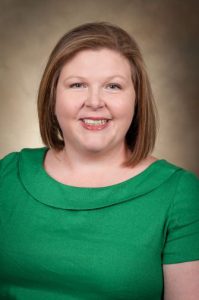From the June 2018 Desktop News | Dr. Memorie Gosa, an assistant professor in UA’s Department of Communicative Disorders, was recently appointed the president of the American Board of Swallowing and Swallowing Disorders (ABSSD). Almost six months into this new role, she is working to expand the recognition of Board Certification in Swallowing and Swallowing Disorders.

The ABSSD is a national organization that provides certification for speech-language pathologists who specialize in the identification and treatment of swallowing disorders, commonly called referred to as dysphagia.
“I believe specialty certification is a valuable tool for clinicians to distinguish themselves as true experts in this area,” Gosa said. “It is also a valuable tool for patients and their families who are looking for experts in dysphagia.”
Gosa began her career working with infants and children who had feeding and swallowing disorders, and she received her board certification in 2009. By 2012, Gosa was an elected member of the ABSSD, and she helped to revise the certifying examination. She also served on the mentorship committee and as the editor for the Easy 2 Digest quarterly newsletter.
“I enjoy the outreach work I’ve done with the mentorship committee,” Gosa said. “This allows me to meet and partner with speech-language pathologists that are interested in pursuing specialty distinction. Together, we develop a plan to meet the rigorous standards of specialty certification, and then we continue to evaluate that plan and adjust as needed to help the clinicians eventually achieve their goals of earning this certification.”
Gosa was appointed the president of ABSSD in 2017 after being recommended by the previous chair and the executive committee with her term beginning in January of 2018. This appointment allowed her to take a leading role in the development and promotion of the BCS-S distinction. Since taking on the responsibility of chair she has identified areas of improvement including advancing recognition of BCS-S value for consumers, increasing corporate partnerships to promote BCS-S in clinical settings, and exploring the need and opportunity to develop training standards for performing diagnostic assessments related to identification of dysphagia.